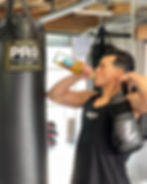Why Athletes Are Switching From Coffee to Yerba Mate
- drinkerva
- Oct 29, 2025
- 4 min read
Athletes want steady energy, from early-morning training blocks to late-day lifts, without the spikes and slumps. Coffee provides an immediate boost but often comes with jitters, crashes, and GI distress.
For athletes, yerba mate provides a plant-powered alternative to traditional pre-workout routines. Yerba mate provides steady energy and mild stimulation that supports sports performance and recovery without the pitfalls.
This guide to yerba mate breaks down the science around how mate functions, when to use it, and why more pros and weekend warriors are making the switch.
Why Athletes Are Rethinking Coffee
Coffee’s caffeine surge can create stimulation, but combined with the necessary workout intensity, it can also trigger cortisol spikes, jitters, or an upset stomach, especially before longer sessions. Athletes require activated states of calm focus, gastric comfort, and game or workout-day routines that do not impact hydration or pacing.
Coffee alternatives for athletes are gaining popularity because they offer a natural energy boost without the jitters associated with traditional coffee. Yerba mate fits that profile slot perfectly. It provides mild stimulation, antioxidant support, and a smooth ride from the warm-up phase to the cool-down. This is not about replacing coffee altogether. It is about assessing what works for your training demands.
Performance Physiology: Smooth Energy, Better Flow
Yerba mate has three main active ingredients: caffeine, theobromine, and theophylline. Caffeine provides alertness, theobromine provides dilation of blood vessels and relaxation of smooth muscle, and theophylline may aid in respiratory ease.
Together, they create stable arousal for pacing, decision-making, and technical skills, without the jittery overstimulation coffee can cause. The polyphenols that accompany yerba mate have active antioxidant capacity, even when consumed in high amounts. Thus, yerba mate helps the body deal with oxidative stress during demanding activities. For athletes using yerba mate, this translates to a cleaner focus and improved flow state, whether you're running intervals or drilling technique.
Metabolic Support and Endurance

Studies indicate that yerba mate can help enhance fat oxidation while sparing glycogen during steady-state exercise. This could manifest as fewer ‘energy dips’ during long runs or rides, more consistent tempos, and improved pacing.
If you plan to use yerba mate for more prolonged exercise bouts, consider adding electrolytes and limiting added sugars, especially when training in a fasted state. The metabolic benefit from consuming yerba mate is unlikely to be huge, but it is substantial enough, especially for endurance athletes seeking a solid energy output without constant refueling.
When these benefits are combined, yerba mate can become a functional ergogen for athletes.
Recovery Matters: Inflammation, Gut, and Sleep
Anti-inflammatory nutrients, including antioxidants and saponins, are present in yerba mate, which naturally support an anti-inflammatory profile post-exercise. Many athletes often report less gastrointestinal irritation when drinking yerba mate compared to strong coffee. They have found it much easier on their GI tract, both pre- and post-workout, compared to coffee. A gradual energy curve involved with mate also supports an evening wind-down much better.
Nutrition is essential for recovery, but recovery isn't only about what you put in your body; it is about how your body feels in between sessions. Yerba mate supports by adding a gentler energy, reducing acidity in your gut and stomach, and providing a stimulating effect.
Is Yerba Mate Better Than Coffee for Exercise?
So, do you choose yerba mate over coffee for exercise? This is dependent on your goals and body. Particular athletes may desire a half cup or so of yerba mate for a more stable stimulation of caffeine without the acidity and jitters experienced with coffee. Coffee has its advantages for providing quick energy before performing a max-effort lift or early morning sprint work.
In many instances, however, yerba mate will win when skill-heavy practice is involved, if it is hot, or if your stomach is sensitive to coffee. The key here is context; if coffee leaves you shaky or crashes you mid-session, yerba mate will likely offer a more stimulating alternative.
The benefit of yerba mate for athletes lies in its consistency, providing energy you can rely on without negative consequences.
How Athletes Use Erva: Timing, Formats, and Doses
Let us explore the best timing, manner, and doses of yerba mate:
When to Use Yerba Mate
Consume 30-45 minutes before a workout to provide steady energy for the start.
Midday intentional focus blocks between sessions.
Avoid large doses in the late evening to protect your sleep.
How to Use Yerba Mate
Loose-leaf in a French press or other infuser to establish a training ritual.
Cold brew when it has warmed up or for long bike rides.
Pre-packaged, ready-to-drink cans for gym bags and quick travel ease.
Doses
Start in modest amounts and titrate upwards based on the length of your session and your caffeine sensitivity. A standard serving has a moderate amount of caffeine, enough to enhance performance without overloading your system's capabilities. Experiment with the timing and format of serving to find what works best for you and your routine.
Yerba mate is beneficial for all athletes, and it can easily fit into your schedule, whether you are preparing for a competition or just trying to maintain base fitness during the off-season.
Train Clean, Recover Smarter

Yerba mate for athletes provides smooth energy, metabolic support, and recovery-friendly attributes, without the crash that coffee might bring or jitters.
Yerba mate is not a magic pill, but a functional upgrade for any athlete looking to change up their pre-workout routine. Train clean, recover smarter, and let your energy be where it should be.
